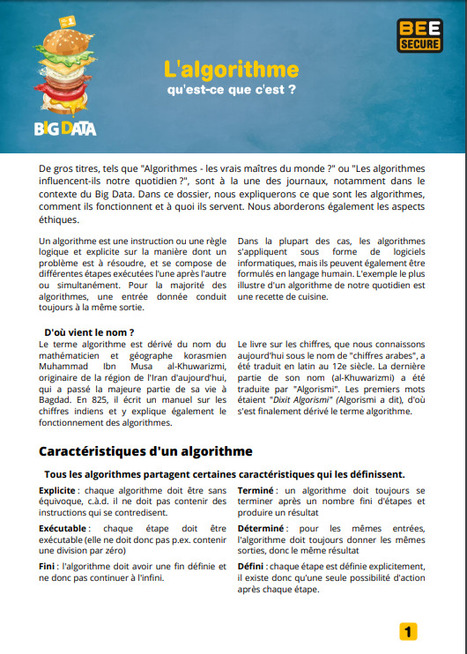De gros titres, tels que "Algorithmes - les vrais maîtres du monde ?" ou "Les algorithmes influencent-ils notre quotidien ?", sont à la une des journaux, notamment dans le contexte du Big Data. Dans ce dossier, nous expliquerons ce que sont les algorithmes, comment ils fonctionnent et à quoi ils servent. Nous aborderons également les aspects éthiques.
Un algorithme est une instruction ou une règle logique et explicite sur la manière dont un problème est à résoudre, et se compose de différentes étapes exécutées l'une après l'autre ou simultanément. Pour la majorité des algorithmes, une entrée donnée conduit toujours à la même sortie. Dans la plupart des cas, les algorithmes s'appliquent sous forme de logiciels informatiques, mais ils peuvent également être formulés en langage humain. L'exemple le plus illustre d'un algorithme de notre quotidien est une recette de cuisine.
D'où vient le nom ?
Le terme algorithme est dérivé du nom du mathématicien et géographe korasmien Muhammad Ibn Musa al-Khuwarizmi, originaire de la région de l'Iran d'aujourd'hui, qui a passé la majeure partie de sa vie à Bagdad. En 825, il écrit un manuel sur les chiffres indiens et y explique également le fonctionnement des algorithmes. Le livre sur les chiffres, que nous connaissons aujourd'hui sous le nom de "chiffres arabes", a été traduit en latin au 12e siècle. La dernière partie de son nom (al-Khuwarizmi) a été traduite par "Algorismi". Les premiers mots étaient "Dixit Algorismi" (Algorismi a dit), d'où s'est finalement dérivé le terme algorithme.
Learn more / En savoir plus / Mehr erfahren:
https://www.scoop.it/t/21st-century-learning-and-teaching/?&tag=Algorithm
https://www.scoop.it/t/21st-century-learning-and-teaching/?&tag=Big+Data...



 Your new post is loading...
Your new post is loading...











Le terme algorithme est dérivé du nom du mathématicien et géographe korasmien Muhammad Ibn Musa al-Khuwarizmi, originaire de la région de l'Iran d'aujourd'hui, qui a passé la majeure partie de sa vie à Bagdad. En 825, il écrit un manuel sur les chiffres indiens et y explique également le fonctionnement des algorithmes. Le livre sur les chiffres, que nous connaissons aujourd'hui sous le nom de "chiffres arabes", a été traduit en latin au 12e siècle. La dernière partie de son nom (al-Khuwarizmi) a été traduite par "Algorismi". Les premiers mots étaient "Dixit Algorismi" (Algorismi a dit), d'où s'est finalement dérivé le terme algorithme.
Learn more / En savoir plus / Mehr erfahren:
https://www.scoop.it/t/21st-century-learning-and-teaching/?&tag=Algorithm
https://www.scoop.it/t/21st-century-learning-and-teaching/?&tag=Big+Data...